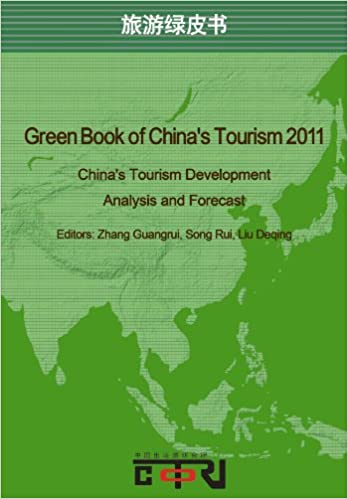Where and When do Chinese Travel Outside China?

Where and When do Chinese Travel Outside China?
Where and When do Chinese Travel Outside China?ä¸å›½æ¸¸å®¢å‡ºå¢ƒæ¸¸çš„目的地和时间选择
By Scott Wayne and Anna Xie 斯科特.韦æ©å’Œè°¢å®‰å¨œ
According to a recent report by the China Tourism Academy (CTA), in the first half of 2011, approximately 32 million Chinese traveled abroad and spent US$28 billion, up by 19% and 17% respectively over the same period in 2010. According to the United Nations World Tourism Organization, China will be the world’s fourth-largest source of outbound tourists by 2020, with 100 million outbound travelers. With such delectable numbers, many destinations are striving to attract more Chinese tourists, especially while the traditional outbound generating markets of the US, Western Europe and Japan are still mired with economic challenges, which have softened some international outbound travel. ä¸å›½æ—…æ¸¸ç ”ç©¶é™¢æœ€è¿‘çš„ä¸€ä»½æŠ¥å‘ŠæŒ‡å‡ºï¼Œ2011上åŠå¹´å¤§çº¦æœ‰ä¸‰åƒä¸¤ç™¾ä¸‡ä¸å›½æ¸¸å®¢åˆ°å›½å¤–旅行,花费高达二百八å亿美元。分别比2010å¹´åŒæœŸå¢žé•¿19%å’Œ17%。 æ ¹æ®è”åˆå›½ä¸–界旅游组织数æ®ï¼Œåˆ°2020å¹´ä¸å›½å°†æ˜¯ä¸–界第四大出国旅游客æºå›½ï¼Œæœ‰å°†è¿‘1亿出国游客。这些数æ®ä½¿å¾—å„大国家都想尽方法æ¥å¸å¼•æ›´å¤šçš„ä¸å›½æ¸¸å®¢ï¼Œå°¤å…¶å½“ç¾Žå›½ï¼Œè¥¿æ¬§å’Œæ—¥æœ¬è¿™äº›ä¼ ç»Ÿçš„å‡ºå¢ƒæ¸¸å®¢æºå›½çš„ç»æµŽä»å—到挑战的时候,他们出境游的人数也呈疲软状æ€ã€‚
According to Qunar.com, the world’s largest Chinese language travel website, the top destinations for travelers from Beijing were Hong Kong, Tokyo, Seoul, Singapore, Bangkok, New York, Paris, Kuala Lumpur, London and Sydney.
Other destinations are also attempting to “capture†Chinese travelers. India, for example, has launched its ‘Incredible India’ campaign with dances and cultural events throughout China presenting India in an effort to woo Chinese visitors. Sri Lanka is also looking towards China to boost its inbound tourism. And the Melbourne Convention and Exhibition Center has increased its marketing efforts in response to more interest among Chinese enterprises in incentive trips for their staff. æ ¹æ®ä¸–界范围最大的ä¸æ–‡è¯è¨€æ—…游网站-去哪儿网,从北京出å‘çš„ä¸å›½æ¸¸å®¢é¦–选的å‰ååç›®çš„åœ°åŒ…æ‹¬ï¼šé¦™æ¸¯ï¼Œä¸œäº¬ï¼Œé¦–å°”ï¼Œæ–°åŠ å¡ï¼Œæ›¼è°·ï¼Œçº½çº¦ï¼Œå·´é»Žï¼Œå‰éš†å¡ï¼Œä¼¦æ•¦å’Œæ‚‰å°¼ã€‚
其他的目的地也设法å¸å¼•ä¸å›½æ¸¸å®¢ã€‚比如å°åº¦åœ¨ä¸å›½å„大城市å¯åŠ¨äº†â€œç¥žå¥‡å°åº¦â€å®£ä¼ 活动,通过å°åº¦çš„舞蹈和文化活动æ¥å±•ç¤ºå°åº¦çš„é…力。斯里兰å¡ä¹Ÿæƒ³é€šè¿‡å¸å¼•ä¸å›½æ¸¸å®¢æ¥æŽ¨åŠ¨å›½å†…的旅游业。å¦å¤–还有墨尔本会展ä¸å¿ƒå·²ç»åŠ 大了在ä¸å›½çš„市场è¥é”€åŠ›åº¦æ¥å¸å¼•ä¸å›½çš„ä¼ä¸šä¸ºå‘˜å·¥æ供到墨尔本的奖励性旅游。
As these and other destinations are learning, it is essential to understand the behavior of Chinese outbound travelers: å„大目的地都在争相å¸å¼•ä¸å›½æ¸¸å®¢ï¼Œæœ€å…³é”®çš„是è¦äº†è§£ä¸å›½å‡ºå¢ƒæ¸¸æ¸¸å®¢çš„æ¶ˆè´¹ä¹ æƒ¯ï¼š
- According to the Chinese hotel and destination review website Daodao.com (the Chinese version of Trip Advisor), about 34 percent of Chinese travelers choose budget hotels, 26 percent four-star hotels and 16 percent five-star hotels. æ ¹æ®ä¸å›½é…’店和目的地评价网站-到到网,大约有34%çš„ä¸å›½æ¸¸å®¢é€‰æ‹©ç»æµŽåž‹é…’店,26%选择4星级酒店,还有16%的选择5星级酒店。
- Increasing numbers of Chinese prefer to visit one or two countries during an overseas trip. 越æ¥è¶Šå¤šçš„ä¸å›½æ¸¸å®¢ä¸€è¶Ÿå‡ºå¢ƒæ¸¸ä¼šæ¸¸è§ˆä¸€åˆ°ä¸¤ä¸ªå›½å®¶ã€‚
- More than 61 percent of Chinese tourists conducted online research ahead of their trips and about 48 percent of travelers adjusted their trips after conducting this research. 多于61%çš„ä¸å›½æ¸¸å®¢åœ¨å‡ºæ¸¸å‰ä¼šä¸Šç½‘åšä¸€äº›è°ƒæŸ¥å‡†å¤‡ï¼Œå…¶ä¸48%的游客会在网上调查之åŽè°ƒæ•´è‡ªå·±çš„出游计划。
- Shopping is perhaps the most important activity for Chinese traveling abroad with western brands and especially designer brands favored most. Prices are lower for top brands outside China. And the brands demonstrate a person’s social status and wealth. 对于ä¸å›½æ¸¸å®¢æ¥è¯´ï¼Œè´ç‰©å¤§æ¦‚是最é‡è¦çš„活动之一,尤其是欧美的å“牌,特别是设计师的牌å。由于这些å“牌的售价在ä¸å›½æ¯”在境外高。而且通过这些å“牌å¯ä»¥å±•ç¤ºä¸ªäººçš„社会地ä½å’Œè´¢å¯Œã€‚
- Most Chinese travel occurs during holidays 大部分ä¸å›½æ¸¸å®¢åœ¨èŠ‚å‡æ—¥å‡ºæ¸¸
| Public Holidays ä¸å›½çš„法定节日 | |
| New Year’s Day æ–°å¹´ | January 01Â ä¸€æœˆä¸€å· |
| Spring Festival (Chinese New Year) 春节 | Lunar calendar, varies, longest holiday, students have 1 month off and worker can have 3 days to 2 weeks off ä¸å›½çš„农历新年,å¦ç”Ÿå¯ä»¥æœ‰ä¸€ä¸ªæœˆçš„å‡ï¼Œå…¬å¸å‘˜å·¥æœ‰3å¤©åˆ°äºŒå‘¨çš„å‡ |
| Tomb Sweeping Festival 清明节 | April 05 å››æœˆäº”å· |
| Labor Day 劳动节 | May 01 äº”æœˆä¸€å· |
| Dragon Boat Festival 端åˆèŠ‚ | June, varies based on lunar calendar 一般在6月,ä¾å†œåŽ†è€Œå®š |
| Mid-Autumn Festival ä¸ç§‹èŠ‚ | September, varies based on lunar calendar ä¹æœˆï¼Œä¾å†œåŽ†è€Œå®š |
| National Day 国庆节 | Oct.1-3 (plus weekends, usually extended to 1 week) å月1-3å·ï¼ŒåŠ 上åŒä¼‘æ—¥ï¼Œæœ‰ä¸€å‘¨çš„å‡ |
| Summer Holiday æš‘å‡ | Mainly for students and teachers, more than 2 months offÂ åœ¨æ ¡çš„å¦ç”Ÿå’Œè€å¸ˆï¼Œèƒ½æœ‰2ä¸ªå¤šæœˆçš„å‡ |
For deeper information on Chinese travel habits, check out the following: 更多关于ä¸å›½æ¸¸å®¢çš„详细信æ¯ï¼Œè¯·å‚照以下资料:
The Green Book of China’s Tourism is compiled annually in Chinese by the Tourism Research Centre, Chinese Academy of Social Sciences (CASS), the highest-ranking academic institution in China. It includes reports on China’s domestic, inbound and outbound tourism. In 2011 for the first time Social Sciences Academic Press (SSAP) of China and COTRI are cooperating to present this translation in English. The Green Book of China’s Tourism offers 16 chapters edited by tourism experts Zhang Guangrui, Song Rui and Liu Deqian and written by foremost academics, administrators and practitioners of tourism in China. The Green Book provides comprehensive analysis, forecast and prospect on key issues in Chinese tourism related to the industry, government policy, destinations and tourism research. ä¸å›½æ—…æ¸¸ç»¿çš®ä¹¦æ˜¯ç”±æ—…æ¸¸ç ”ç©¶ä¸å¿ƒå’Œä¸å›½æœ€å…·æƒå¨çš„ä¸å›½ç¤¾ç§‘院è”æ‰‹æ‰“é€ ã€‚å®ƒåŒ…æ‹¬äº†ä¸å›½å›½å†…旅游,入境游和出境游的å„个报告。2011年,ä¸å›½ç¤¾ä¼šç§‘å¦æ–‡çŒ®å‡ºç‰ˆç¤¾å’Œä¸å›½å‡ºå¢ƒæ¸¸ç ”究所第一次è”手推出æ¤ä¹¦çš„英文版。ä¸å›½æ—…游绿皮书æ供了由ä¸å›½æ—…æ¸¸ä¸šä¸“å®¶å¼ å¹¿ç‘žï¼Œå®‹ç‘žå’Œåˆ˜å¾·è°¦ç¼–è¾‘çš„ï¼Œä»¥åŠæƒå¨å¦è€…,行政管ç†è€…和业内人士撰写的16ä¸ªç« èŠ‚ã€‚ç»¿çš®ä¹¦æ供了ä¸å›½æ—…游涉åŠåˆ°è¡Œä¸šï¼Œæ”¿ç–,目的地和å¦æœ¯ç ”究的旅游综åˆå¹¿æ³›çš„分æžï¼Œé¢„测以åŠå‰æ™¯ã€‚

